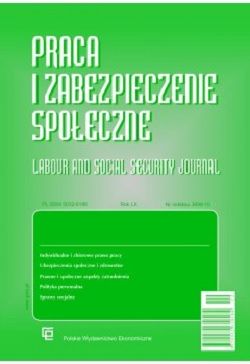
- Employer's right to inspect employees in relation to the COVID-19 threat (3-9)
The COVID-19 pandemic raises the need for greater protection of workers from the disease. Massive employers began to use temperature control methods and even tests for the presence of the virus. In the public space, there was a discussion about the admissibility of inspection due to the protection of the right to privacy. In the article, the author draws attention to the values protected in law and their importance in a situation of social danger. - Controversies regarding the principles of determining remuneration for work - selected issues (10-16)
The aim of the article is to draw attention to selected, current examples of determining remuneration for work, which violate generally accepted principles in this area and give rise to controversies both in theory and practice. On this basis, the author tries to formulate conclusions from which it follows that violations of generally accepted principles of remuneration are committed not only by employers and social partners, but also by the legislator himself, and that the controversy concerns not only the initial determination of remuneration, but also changes unfavorable for the employee. According to the author, it is not possible to formulate rules for determining remuneration for work that would apply to all cases equally. The only exception is the principle of non-discrimination and unequal treatment of employees. - Living communities of dependent people and family nursing homes (17-26)
In the face of the observed and forecasted demographic changes, the author formulates the thesis according to which the communities of dependent people, constituting an alternative to institutional care, could prove helpful in solving the demographically conditioned problem of insufficient access to informal long-term care. This thesis is further developed by presenting the instruments adopted in the German long-term care insurance aimed at supporting the creation and functioning of housing communities of dependent people. Against this background, the author critically analyzes the regulation of establishing and running a family nursing home as a special form of providing care and living services provided for in Polish social assistance law, which could constitute the basis for establishing housing communities for dependent people. - Employment relationship without an employer? (27-31)
The author analyzes the provisions on the termination of employment in connection with the death of the employer who ran the enterprise. The provisions of the labor law provide that, despite the death of the employer, employment relationships do not expire in the event of: transfer of the workplace to a new employer, establishment of succession management upon the death of the employer, and in the event of failure to establish such management - employment relationships generally expire after 30 days. since the death of the employer. In this legal state, it may happen that employment relationships will exist despite the physical absence of an employer. The removal of this defect requires a change in the regulations, and until then the author proposes to adopt the concept of a substitute employer, which is the commune or the State Treasury. - Admissibility of conflicting employee compensation claims in the event of unlawful termination and termination of an employment contract without notice (32-36)
The aim of the article is to analyze the claims of an employee in the event of a defective termination of an employment contract without notice, which was previously terminated, also in violation of the law. The author presents the changing approach of the jurisprudence to the possible confluence of claims and proposes her own solution to the above issue. - Employer's liability due to mobbing under Polish labor law (37-41)
The regulation on mobbing was introduced to the Polish Labor Code by the Act of 2003. Since then, the issue of liability has been the subject of numerous scientific analyzes and judicature statements, although to this day it is controversial or even controversial in many respects. In 2019, the legislator decided to introduce a significant change in the premises of the employer's liability in this respect. In this article, the author presents the issues of claims against the employer under this title, as well as outlines controversial issues in this area. The relevant comments were preceded by a short description of the content of the concept of mobbing in the Polish Labor Code. - Non-discrimination and freedom of expression (42-45)
The author discusses the judgment of the Court of Justice of the EU of April 23, 2020 in the case C-507/18, which concerns the scope of application of Council Directive 2000/78 / EC of November 27, 2000 establishing a general framework for equal treatment in employment and occupation, the admissibility of restrictions on the freedom of expression due to the implementation of the prohibition of discrimination on the basis of sexual orientation, as well as the procedural legitimacy of associations in cases of compliance with the obligations arising from this directive. - Sanctions for breach of formal requirements by an employee when terminating or terminating an employment contract (46-47)
The author presents the jurisprudence of the Supreme Court with regard to the issue of formal defectiveness of termination of an employment contract or its immediate termination by an employee. - What changes in the labor law are envisaged by Shield 4.0? (48-49)
- Review of Journal of Laws of 2020 from item 1000 to pos. 1183 (50-52)
Praca i Zabezpieczenie Społeczne (Work and Social Security) - the whole list






